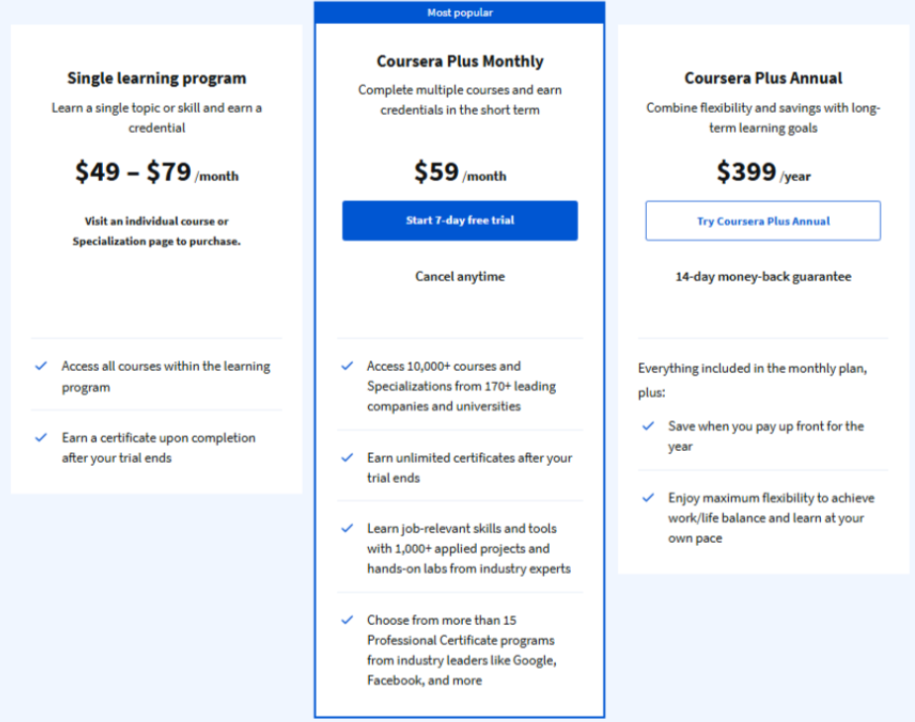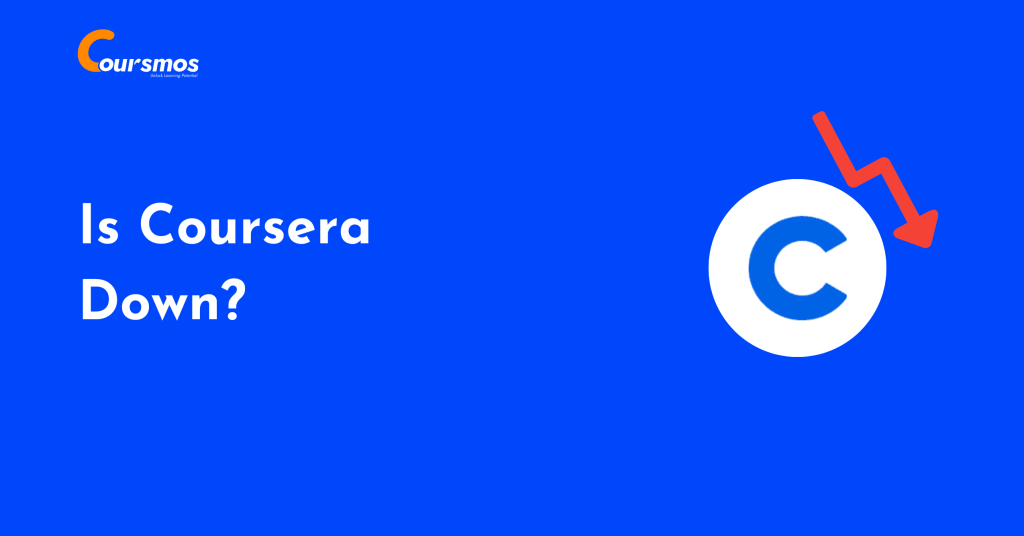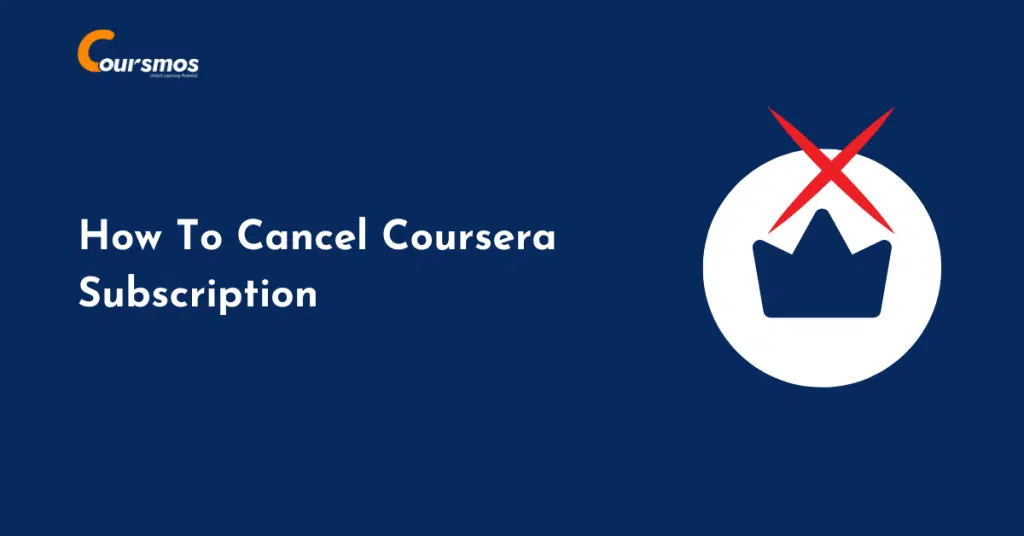Coursera Plus offers unlimited access to 10,000+ courses, while Coursera lets you pay per course.
If you’re only eyeing 1–2 certificates, paying per course ($49–$79) might be smarter. However, if you’re aiming for career transitions, resume stacking, or skill mastery across subjects, Coursera Plus at $399/year offers far more value.
In this comparison, I will break down key differences, pricing, pros, and who should choose what, so you spend smart and learn better.

Get 40% OFF For 3 Months on Coursera Plus
With this offer, you can save upto $70.
Key Difference Between Coursera And Coursera Plus
Coursera and Coursera Plus provide excellent learning opportunities but cater to different user needs. Coursera allows you to pay per course, and Coursera Plus offers unlimited learning through a subscription model.
| Features | Coursera (Individual Courses) | Coursera Plus (Subscription) |
|---|---|---|
| Course Access | Limited to the course you purchase. | Unlimited access to 10,000+ courses & specializations |
| Pricing | Pay-per-course ($49–$79 on average). | $59/month & $399/year |
| Certificates | It must be purchased separately per course. | Unlimited certificates |
| Learning Flexibility | Yes | Yes |
| Best For | Learners needing 1-2 courses. | Lifelong learners, professionals, and career changers taking multiple courses |
| Financial Aid & Discounts | Available for some individual courses | Available on some courses |
If you need only one or two courses, Coursera’s pay-per-course option is more affordable. However, Coursera Plus offers better value if you plan to take multiple courses throughout the year.
Now, let us look at an in-depth answer to what is the difference between Coursera and Coursera Plus
Who Should Choose Coursera?
Coursera is ideal for college students who need one or two additional courses to enhance their academic studies. It’s also ideal for working professionals who want to gain a specific skill or earn a certificate for career advancement.
High school students exploring career paths can also benefit from Coursera’s flexible learning model. If you are on a budget and need financial aid, Coursera offers assistance with selected individual courses, making them accessible to many learners.
Who Should Choose Coursera Plus?
Coursera Plus is perfect for lifelong learners who enjoy continuous learning across various subjects. University students looking to build a strong resume with multiple certificates can benefit from unlimited access.
Career changers who need to take several courses in a new field, such as IT, data science, or business, will find Coursera Plus a cost-effective choice. Professionals seeking promotions or skill upgrades can also utilize Coursera Plus to earn multiple certifications without incurring additional costs.
Free Trial On Coursera And Coursera Plus
Coursera does not offer a free trial on the basic plan. There is a 7-day trial period on Coursera Plus on a monthly subscription.

During this period, you can explore courses, complete assignments, and decide if it’s worth the investment. Coursera offers free courses in various subjects, including business, technology, health, personal development, arts, etc.
However, in the free plan and free trial, you’ll get access to lectures but won’t receive a certificate.
Coursera Vs. Coursera Plus Offerings
Coursera and Coursera Plus both provide learning opportunities, but their offerings differ in terms of access, pricing, and flexibility. Understanding these differences can help you make informed choices based on your educational and career goals.
What Does Coursera Offer?
Coursera provides access to online courses, specializations, and professional certificates from top universities and companies worldwide. You can choose from thousands of free and paid business, technology, data science, and healthcare courses.

Some courses offer certificates upon completion, but they require an additional fee. Coursera also offers university degrees and MasterTrack certificates, enabling learners to pursue accredited online education.
What Is Coursera Plus?
Coursera Plus is a subscription plan that grants unlimited access to 10,000+ courses, specializations, and professional certificates. Subscribers can earn as many certificates as they want without incurring additional fees for each course.

It includes content from major institutions and universities like Google, Microsoft, IBM, Yale, etc. This plan benefits those who want to take multiple courses throughout the month or year while saving on individual course fees.
Coursera Vs. Coursera Plus Cost

Get 40% OFF For 3 Months on Coursera Plus
Buy Coursera Plus annual plan at just $319.20 instead of $399.

Get 20% OFF On Coursera Plus Annual
Buy Coursera Plus annual plan at just $319.20 instead of $399.
Coursera offers flexible pricing based on individual courses, certificates, and degrees, while Coursera Plus provides unlimited courses based on a fixed subscription fee.
Below is a breakdown of their pricing structures:
| Plan | Cost | Billing Type |
|---|---|---|
| Coursera (Individual Courses) | $49–$79 per course (on average) | One-time payment |
| Coursera Plus (Monthly Plan) | $59 per month | Recurring monthly |
| Coursera Plus (Annual Plan) | $399 per year | Recurring yearly |
A Coursera individual plan is ideal for learners who want to complete one or two specific courses. It is a good option for students or professionals seeking targeted learning experiences without committing to a subscription.

Coursera Plus offers flexibility and cost savings, particularly for individuals seeking certifications and specializations. Remember, there is no specific Coursera student discount, but they can get all the benefits like all other learners.
You can still save on Coursera Plus using our discount code.
Pros and Cons of Coursera and Coursera Plus
Both Coursera and Coursera Plus provide access to high-quality courses from top institutions. Here are the advantages and drawbacks to help you decide which suits you best.
Coursera (Individual Courses)
Coursera’s pay-per-course model is great for learners who need specific courses without committing to a subscription. However, it may not be the best choice for those taking multiple courses regularly.
Coursera Pros
✅ Pay only for what you need.
✅ Access to most courses and certifications.
✅ Financial aid is available for some courses.
Coursera Cons
❌ Costs add up if taking multiple courses.
❌ Some courses require extra payment for certificates.
Coursera Plus (Subscription)
Coursera Plus is ideal for learners who plan to take multiple courses, but it does have some limitations. Not all courses are included, and the subscription cost may not be justified for casual learners.
Coursera Plus Pros
✅ Unlimited access to 10,000+ courses.
✅ More affordable for frequent learners.
✅ Earn unlimited certificates at no extra cost.
✅ Access to specializations and professional certificates.
✅ Flexible learning with no restrictions on course selection.
Coursera Plus Cons
❌ Higher upfront cost for casual learners or those on a tight budget.
❌ A subscription may not be worth it for those taking only a few courses.
Tips To Select The Best Between Coursera And Coursera Plus
Here are some key factors to consider before making your decision between Coursera and Coursera Plus:
- Number of courses you need: Choose Coursera for a few courses; Coursera Plus for multiple courses.
- Budget: If cost is a concern, compare the per-course price with Coursera Plus’s subscription fee.
- Certificate requirement: There is always confusion among users that, Are Coursera certificates worth it?, but the fact is that Coursera certificates are widely known by industries and universities, which opens the door to many opportunities.
You can go with Coursera Plus, as it does not charge extra to earn certification after course completion.
- Course availability: Not all courses are included in Coursera Plus, such as MasterTrack® Certificates. Check if your desired courses are available in the plan.
- Learning Duration: Coursera Plus is ideal for long-term learning, while Coursera is more suitable for short-term needs.
- Career goals: Choose Coursera Plus for professional development; Coursera suits learners needing specific skills.
- Subscription commitment: Coursera Plus requires a monthly or annual commitment, whereas Coursera offers flexibility per course.
Related Reads:
Conclusion: Coursera Plus Is Better For Users Than Coursera
Your choice between Coursera Plus vs Coursera boils down to learning frequency, budget, and career goals.
If you need only one or two specific skills, Coursera’s pay-per-course model is both flexible and affordable.
But if you’re planning to earn 5+ certificates per year, Coursera Plus can save you over $500 annually.
With access to courses from Google, IBM, Yale, and more, along with a 7-day free trial, it’s ideal for professionals, students, and lifelong learners.
Ultimately, both platforms serve different needs—Coursera is great for quick upskilling, while Coursera Plus is ideal for immersive, long-term learning.
FAQs
Coursera offers individual courses that require separate payments. At the same time, Coursera Plus is a subscription service providing unlimited access to thousands of classes, specializations, and certificates for a fixed monthly or yearly fee.
Coursera Plus is worth it if you plan to take multiple courses or earn several certificates. It saves money compared to paying for individual courses and is ideal for continuous learning and career advancement.
Coursera Plus is for individuals seeking unlimited learning, while Coursera for Teams is designed for businesses. It includes skills tracking, proficiency testing, and access to nearly 200,000 training videos and labs.
Coursera Plus does not cover full degrees or MasterTrack® Certificates. These require separate payments. However, you can earn unlimited certificates for courses and specializations included in Coursera Plus.
Many employers value Coursera certificates, especially those from reputable universities or companies like Google and IBM. They demonstrate skill development and can strengthen resumes for job applications or career growth.







